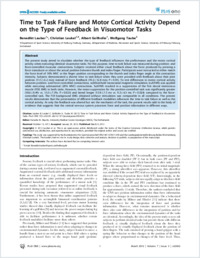Time to task failure and motor cortical activity depend on the type of feedback in visuomotor tasks
- Lauber, Benedikt Department of Sport Science, University of Freiburg, Freiburg, Germany
- Leukel, Christian Department of Sport Science, University of Freiburg, Freiburg, Germany - Department of Medicine, Movement and Sports Science, University of Fribourg, Fribourg, Switzerland
- Gollhofer, Albert Department of Sport Science, University of Freiburg, Freiburg, Germany
- Taube, Wolfgang Department of Medicine, Movement and Sports Science, University of Fribourg, Fribourg, Switzerland
-
09.03.2012
Published in:
- PLoS ONE. - 2012, vol. 7, no. 3, p. e32433
English
The present study aimed to elucidate whether the type of feedback influences the performance and the motor cortical activity when executing identical visuomotor tasks. For this purpose, time to task failure was measured during position- and force-controlled muscular contractions. Subjects received either visual feedback about the force produced by pressing a force transducer or about the actual position between thumb and index finger. Participants were instructed to either match the force level of 30% MVC or the finger position corresponding to the thumb and index finger angle at this contraction intensity. Subjects demonstrated a shorter time to task failure when they were provided with feedback about their joint position (11.5±6.2 min) instead of force feedback (19.2±12.8 min; P = 0.01). To test differences in motor cortical activity between position- and force-controlled contractions, subthreshold transcranial magnetic stimulation (subTMS) was applied while executing submaximal (20% MVC) contractions. SubTMS resulted in a suppression of the first dorsal interosseus muscle (FDI) EMG in both tasks. However, the mean suppression for the position-controlled task was significantly greater (18.6±9.4% vs. 13.3±7.5%; P = 0.025) and lasted longer (13.9±7.5 ms vs. 9.3±4.3 ms; P = 0.024) compared to the force-controlled task. The FDI background EMG obtained without stimulation was comparable in all conditions. The present results demonstrate that the presentation of different feedback modalities influences the time to task failure as well as the cortical activity. As only the feedback was altered but not the mechanics of the task, the present results add to the body of evidence that suggests that the central nervous system processes force and position information in different ways.
- Faculty
- Faculté des sciences et de médecine
- Department
- Département de Médecine
- Language
-
- English
- Classification
- Biological sciences
- License
-
License undefined
- Identifiers
-
- RERO DOC 29151
- DOI 10.1371/journal.pone.0032433
- Persistent URL
- https://folia.unifr.ch/unifr/documents/302476
Statistics
Document views: 129
File downloads:
- pdf: 158
